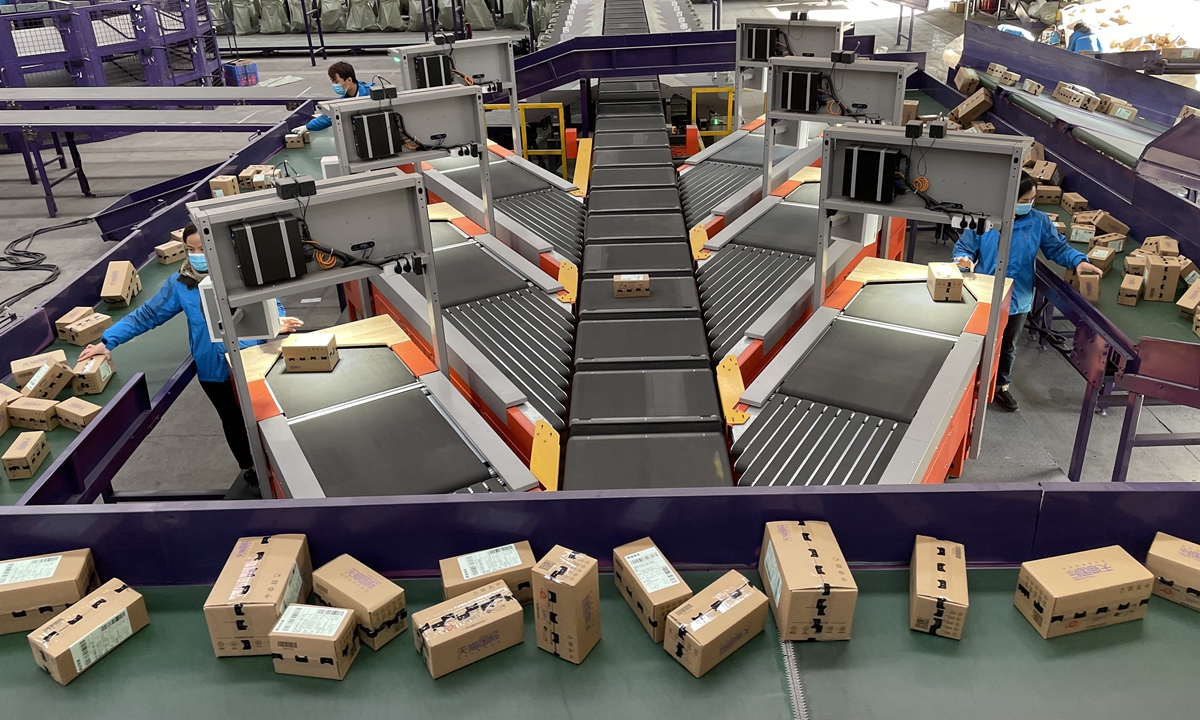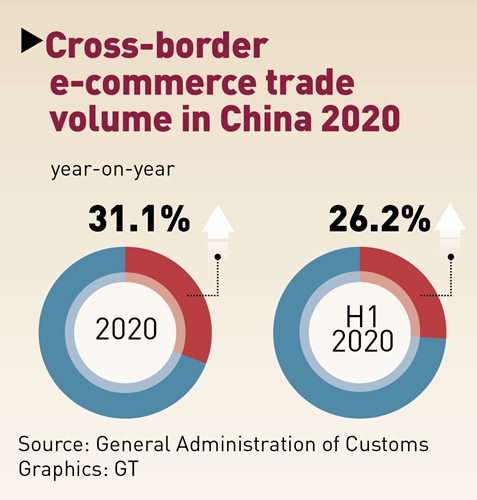Foreign brands rush to join Chinese platforms
Cross-border e-commerce trade a silver lining amid pandemic

View of the cross-border public distribution center in Nansha, Guangdong Province. After the opening of the center on January 12, imported parcels from multiple warehouses will benefit from unified declaration and package distribution, saving 3 to 4 hours a day. Photo: cnsphoto

As the ongoing pandemic has dampened many Chinese consumers' habit of "buying abroad" over the past year, the cross-border e-commerce platforms, which now have become the only channel for many domestic consumers who seek for overseas products, have become a highland for foreign brands who want to keep consumers in the world's second-largest economy.
The booming cross border e-commerce trade between China and other countries, has not only turned out to be a key factor in the recovery of foreign firms who are still struggled in pandemic woes, but is also a silver lining for global trade under the shadow of the pandemic.
According to data provided by Tmall Global, the cross-border business-to-consumer marketplace under Alibaba Group, also one of the most popular platforms in China, more than 29,000 brands across 5,800 categories had come onto the platform at the end of December 2020, and over 80 percent of them are entering China for the first time.
Brands, particularly small- and medium-sized players that have been hard-hit by the COVID-19 pandemic, are trying their best to enter new markets and find fresh channels for growth, according to the platform.
Apart from Tmall, another leading platform JD Worldwide, JD.com's cross-border e-commerce platform, also previously said it has helped 270 new foreign brands to further expand sales channel in China via its platform in the first half of 2020 to meet the increasing consumption demand in the world's second-largest economy, according to previous media reports.
The "foreign brands festival" has attracted an increasing number of Chinese consumers to purchase online. Over the past year, China's cross-border e-commerce imports and exports increased by 31.1 percent year-on-year, according to the latest data released by the General Administration of Customs on January 14.
Figures have further improved from the first half of 2020, when trade volumes via cross-border e-commerce platforms, under the oversight of customs authorities, increased by 26.2 percent year-on-year, with exports and imports up by 28.7 percent and 24.4 percent, respectively.
"Under the weight of the pandemic, cross-border e-commerce, as a new business format, has gone from strength to strength," Li Kuiwen, a customs spokesperson said, noting that cross-border e-commerce has now becoming an important force in stabilizing foreign trade.
Chinese e-commerce platforms have also been investing heavily to advance this trend, providing convenience and shortening procedures for brands who want to capture a slice of pie in the booming market.
For instance, Tmall Global announced a new suite of solutions at the 2021 Tmall Global New Seller Virtual Summit on Tuesday, to help global brands capture growing consumption opportunities in China.
As the first-ever virtual summit hosted by the platform with regional and category-specific content sessions spanning seven time zones from Tuesday until Thursday. It covers China's cross-border e-commerce landscape and market insights, as well as case studies from different regions and industries, according to Tmall Global.
"We hope to provide foreign merchants with more confidence through this virtual summit, and provide solutions for those who cannot 'go out' due to the pandemic," Maggie Liu, General Manager of Tmall Global, told the Global Times in an interview.
"We've entered a new phase, and it's not just an opportunity for Tmall Global but the cross-border e-commerce industry as a whole. The reason is that Chinese consumers can't travel abroad right now, but the demand is still there," Liu said, adding that the most popular categories on its platforms are health products, beauty instruments and home appliances.
In addition to a streamlined on-boarding process, overseas brands and retailers will receive tailored consultation, operations and content support as well as other value-added services through Tmall Global and its partner network worldwide. Tmall Global will also roll out region-specific programs to further support merchants who plan to join the platform.
Liu said how to attract the local brands which are well-known in other countries but with less global awareness will be another key part, including some brands created by KOL, and some products with best quality in the world, such as Mango and Coffee will also be the key part for their business.
JD.com confirmed in August 2020 that it has held online investment promotion conferences in South Korea and Singapore to reach local brand merchants and help them seek the China market, said media reports.
Analysts said the increasing trend of cross-border e-commerce is also set to continue on the back of China's consumption boom, highly developed logistics support chains, and favorable government policy.
Customs will continue to focus on the development of new business formats and corporate concerns, strengthen supervision, optimize services, further improve supervision and data integrity systems, promoting high-quality development of new cross-border e-commerce business formats, Li Kuiwen, the customs spokesperson said.
Logistics will also be ensured, Liu said, noting that Tmall Global has various freight logistics channels from bonded warehouses to chartered flights and it will also have random checks on the goods. So far, there has no any positive COVID-19 cases reported yet.
Global Times


